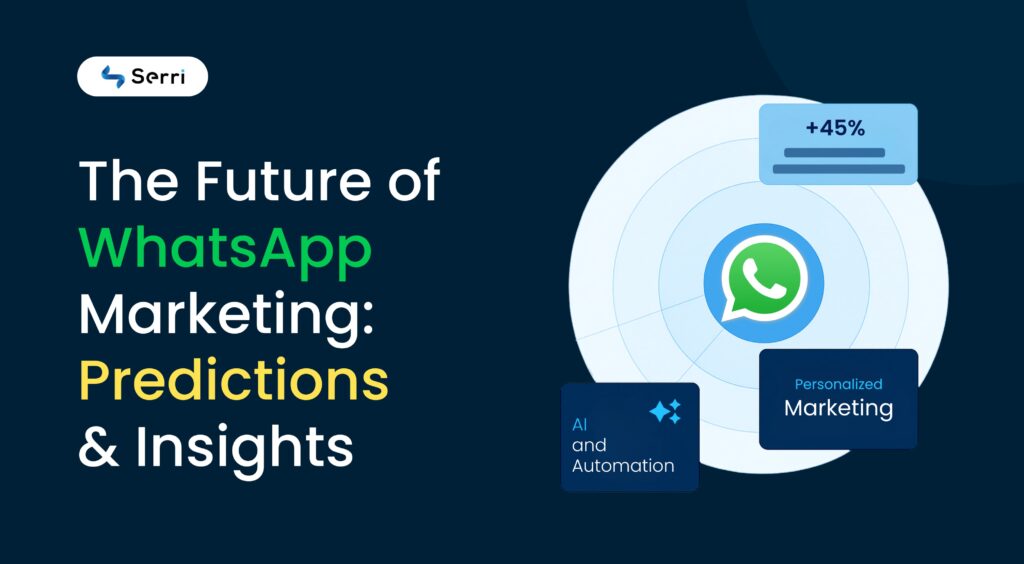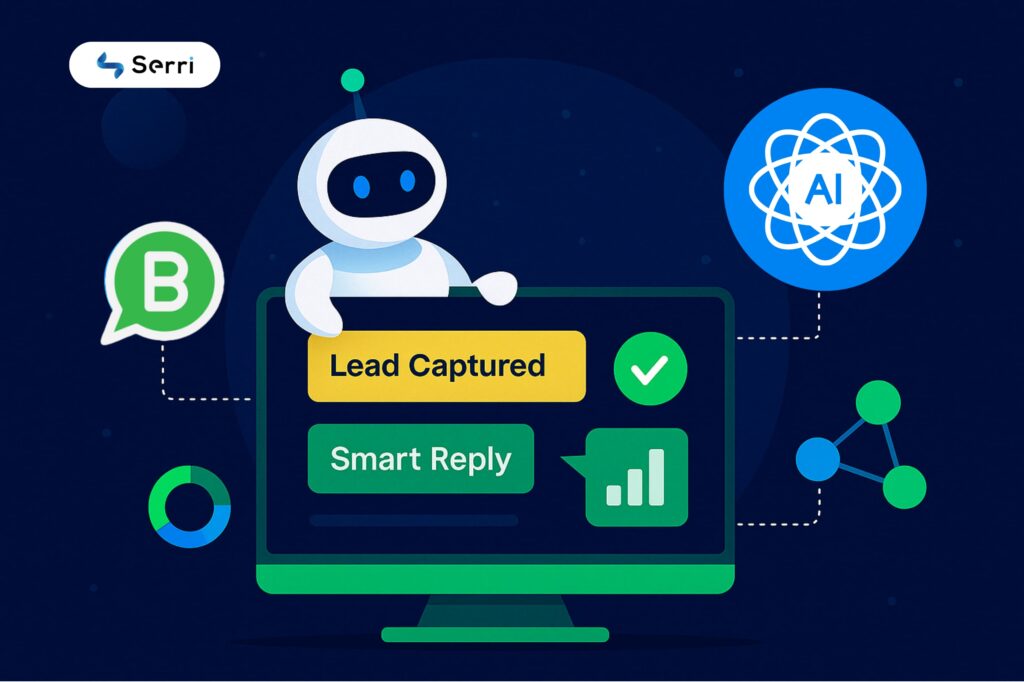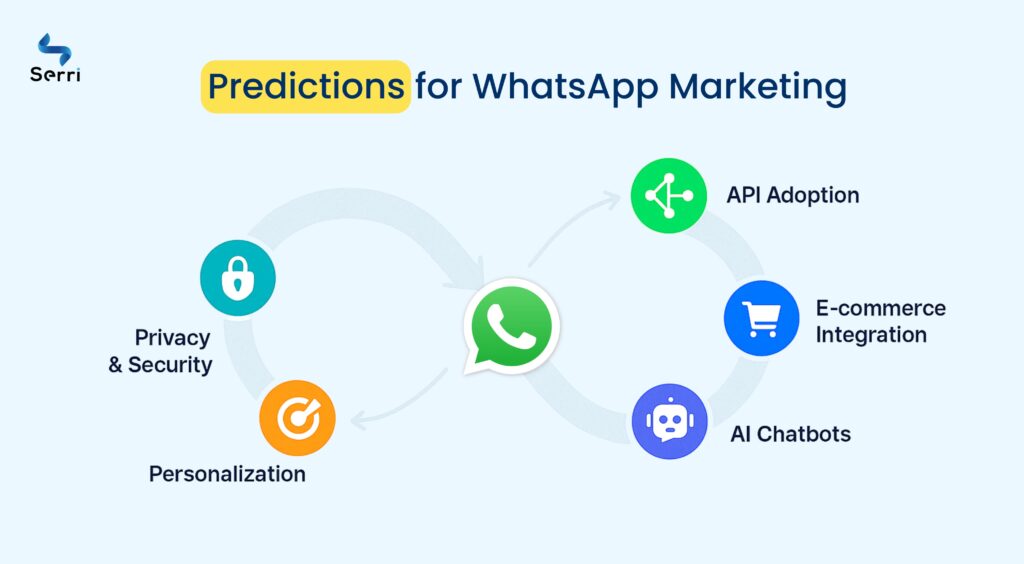
Why WhatsApp Marketing Is Just Getting Started
More than 50 million businesses already use WhatsApp Business, and that number is only expected to grow rapidly. The WhatsApp Business API offers an easy, personalized way to connect with customers.
Businesses using WhatsApp Business API have seen a 10–15% increase in customer engagement and satisfaction.
When integrated with e-commerce platforms, WhatsApp can boost online sales by 20–25% thanks to seamless, personalized shopping experiences.
The Rise of AI and Automation in WhatsApp Marketing
AI is revolutionizing how companies use WhatsApp to market, sell, and support customers.

1. Instant, 24/7 Customer Support
One of the most impactful applications of AI in WhatsApp marketing is automated customer service. AI-powered chatbots can respond instantly to common queries, from order status updates to return policies, no matter the time of day.
According to industry reports, businesses using AI chatbots on WhatsApp reduce first-response time by up to 85%, leading to better customer satisfaction and fewer dropped leads.
Whether it’s resolving issues or providing answers, AI ensures your brand is always available, without needing a round-the-clock human support team.
2. Smarter Conversations with NLP
With natural language processing (NLP), WhatsApp bots can now understand customer intent more accurately. Instead of rigid keyword-based commands, customers can chat naturally, and the AI will still know what they mean.
Example:
User types “I want to return my red shoes.”
AI recognizes the intent (return request) and product (red shoes) and responds appropriately with return instructions — all in real time.
This makes WhatsApp feel less like a support ticket and more like a genuine, human-like conversation.
3. Personalized Product Recommendations
AI algorithms analyze customer behavior, such as past purchases, chat history, and product views, to deliver personalized product suggestions directly in WhatsApp chats.
For instance, a skincare brand can automatically recommend serums based on a customer’s skin type, previous purchases, and even climate data from their location.
This level of personalization can lead to 30–40% higher conversion rates and better customer retention.
4. Automating Marketing Workflows
Automation makes WhatsApp marketing smarter and easier. You can set up workflows that trigger messages based on user actions like a welcome message for new users, cart reminders for shoppers, or re-engagement nudges for inactive customers.
These flows run in the background, ensuring timely communication without manual effort. They help you stay consistent, improve conversions, and give every customer the right message at the right time, all on autopilot.
5. AI-Powered Analytics and Optimization
Businesses are using AI to track which messages get the most clicks, which users drop off, and which campaigns drive ROI. This enables real-time performance tweaks and ongoing campaign optimization.
With smart dashboards and predictive analytics, marketers can forecast customer behavior, segment audiences better, and send messages that truly resonate.
Top Predictions: What’s Next for WhatsApp Marketing?

1. Greater Adoption of WhatsApp Business API
The WhatsApp Business API is no longer just for large enterprises, SMBs are embracing it to automate conversations, send transactional messages, and improve customer support. With plug-and-play integrations becoming more accessible, API adoption is expected to grow by 60% among small businesses by 2026.
2. Seamless E-Commerce & Payment Integration
WhatsApp is fast becoming a shopping hub. With features like product catalogs, shopping carts, and UPI-based payments, users can browse and buy without leaving the app. Expect even deeper e-commerce integrations in the future, such as automated order updates, stock alerts, and personalized offers.
3. Chatbots for Smarter Customer Service
The use of chatbots in WhatsApp business communication will be more prevalent in the future as an efficient way to address customers’ questions. Brands are already deploying virtual agents that handle lead qualification, appointment booking, and even upselling.
4. Hyper-Personalized Messaging Using Data Analytics
WhatsApp will evolve into a hyper-personalized channel. Brands will use behavioral data (clicks, past chats, product views) to create custom message sequences, retargeting funnels, and product recommendations. Campaigns will shift from generic broadcasts to 1:1 intelligent conversations.
5. Stronger Privacy & Data Security
As user data becomes central to marketing strategies, so does the responsibility to protect it. WhatsApp will likely introduce stricter compliance tools, customer opt-in flows, and audit-friendly message templates to align with global data laws like GDPR and India’s DPDP Act.
Kickstart your WhatsApp Marketing journey with Serri

To kickstart your WhatsApp Marketing journey, you can leverage Serri, an official Meta tech partner that enables you to utilize the WhatsApp Business API.
While Facebook doesn’t offer a direct platform for using the WhatsApp Business API, Serri serves as a comprehensive solution.
Serri is a powerful WhatsApp Marketing Platform that allows you to:
- Send WhatsApp Broadcasts to an unlimited number of users.
- Automate notifications for orders, deliveries, and more through seamless integrations.
- Launch retargeting campaigns aimed at users with a higher likelihood of purchasing.
- Facilitate multi-agent live chat across unlimited devices.
- Implement WhatsApp Chatbots to streamline sales processes and handle customer inquiries automatically.
- And much more…
This way, Serri provides all the tools you need to efficiently manage and optimize your WhatsApp Marketing efforts.
FAQ’s
1. What is the future of WhatsApp marketing?
More personalized customer interactions, deeper e-commerce integration, and innovative features like AI and AR will drive the next wave.
2. How do I start WhatsApp Marketing?
Start with a business profile, organize your contact list, and create engaging, value-driven messages.
3. What are the top WhatsApp marketing tools?
Tools like the WhatsApp Business API, CRM integrations, and analytics dashboards are great for scaling your efforts. You can also get started with Serri, which brings all of these features together in one place.
4. How do I measure WhatsApp campaign success?
Track key metrics like open rates, response times, conversion rates, and customer satisfaction scores.